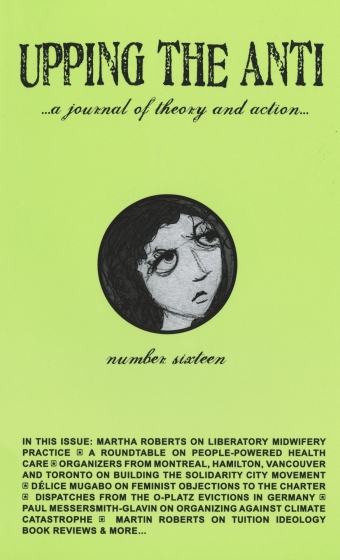Dis-owning Knowledge
Dear UTA,
I was excited to see the publication of an article focusing on critical trans politics in Issue 14 of Upping the Anti. Rob Nichols’s interview with Dean Spade provides a succinct overview of Spade’s critiques of legal frameworks and institutions as these pertain to, and govern, conceptualizations of trans rights and resistance. Drawing clear connections between the law, foundations of US nationalism, state violence, white supremacy, and systemic poverty, the interview successfully contextualizes struggles for trans self-determination within a broader context of struggles against capitalism, dispossession, incarceration, and the militarized production of surplus populations.
By advancing a critique of individualistic rights-based paradigms as part and parcel of the intensifications of neoliberal political economy, this interview articulates a critical trans politics centered on the systems that are most harmful to trans peoples’ lives, including capitalist accumulation, immigration enforcement, and the prison industrial complex. Unsurprisingly, these are the same systems that disproportionately affect most marginalized people, albeit in differential ways. What is unique about the critical trans politics Spade outlines is its capacity to draw specific attention to the ways that racialized and gendered norms about the body and health are written into the mundane aspects of material everyday life (obtaining and using ID, going to school, seeing a physician, getting a job). In this way, a critical trans politics offers left social movements “a particular frame for understanding how processes of gendered racialization are congealed in violent [and everyday] institutions” (43).
While I thought the content of the interview was great, and I agree with much of Spade’s analysis (which has also been presented in countless articles, public talks, filmed interviews, and his recent book, Normal Life), I’ve been thinking a lot about the genre of the interview, specifically with regards to the consequences of “activist exceptionalism” for anything like a vibrant left/critical politics. By “activist exceptionalism” I am referring to the phenomenon of academic celebrity/branding that the interview form often (not always) relies on and reinforces, rendering individual activists as somehow exemplary knowledge producers even though the analyses on offer are distillations of fundamentally collective struggle. What are the material/economic conditions that make such exceptionalism not only possible but somehow necessary to “getting the message across”? What are the consequences of such a politics of celebrity for the very possibility of effective – that is, non-hierarchical, broad-based social movements?
To be clear, I’m not posing these questions as a critique of the authors of “Toward a Critical Trans Politics” themselves (as individuals), but rather to open space for a consideration of the social processes through which the emergence of the vanguard intellectual becomes possible. Certainly, Spade is demonstrably attuned to the ways that spaces of resistance often reproduce the features of society that we are most critical of. The hyper-individualization of the exceptional activist is, however, a case in point. While Spade is, without doubt, among the most cited and influential trans activists working in North America today, the political economy behind this exceptionalism is very much tied up with the US academic star system, reliant as it is on the property-logics endemic to the marking of intellectual-entrepreneurial territory. (As insightful as Spade’s autobiography of politicization that opened the interview was, it also follows the familiar grooves of a “from poverty to productivity” narrative so central to appreciable life under capitalism, as well as to vanguard traditions.) Meanwhile, those advancing a critical trans politics in the streets are rendered predominantly faceless and nameless in archives of attribution, their role as critical knowledge producers too often erased and rendered surplus to – if not first appropriated by – the exceptionalism of activist/academic celebrity. Consider, for but one example, the relative obscurity of Mirha-Soleil Ross – transsexual video maker, performer, sex worker, and animal rights activist – whose voluminous and significant body of work began to advance a provocative “critical trans politics” in the early 1990s, irreverently examining the interconnections between sex, class, speciesism, nationalism, capitalism, and gender long before it was de rigueur to do so.
Like most effects of power, the phenomenon of activist exceptionalism or celebrity is not simply negative; it is also productive. The publication of this interview in UTA, for example, may have a positive effect on the profile of this journal of theory and action, perhaps even expanding the regular readership and funding base (which is of crucial importance to the survival of a space for critical thought). It may also capture the attention of regular readers who remain puzzled about the interconnections between political economy, gender, embodiment, class, racialization, and nation building. This brings me to the part of the interview that I found most intriguing, near the very end, where Nichols asks Spade about models of social transformation: “traditional revolutionary” or “[anarchist] immanence”? Spade aptly responds “both/and.”
But what remains underdeveloped in this closing section is the very exploration of the politics of knowledge production in activist contexts, which is absolutely central to the debate. Traditional revolutionary politics call up the image of the vanguard intellectual, who (ironically) embodies the territorialization/privatization of common property – that of the “exceptional knowledge” produced through collective struggle. Immanent critique, on the other hand, tends to point to the horizontalization and destratification of knowledge production, the making of a knowledge commons oriented toward the deterritorialization of the exceptionalized critic.
The vitality of a critical trans politics depends on the kinds of capacity-building that might dislodge the individualism capitalism promotes and relies on, and which has become intensified under neoliberalism. Rather than continually putting the same people on the mic – no matter how immaculate their take on things is – it is crucial to building our movements to ensure that the labour of intellectual and activist knowledge production remains collaborative and shared. Beyond this, it is crucial that the fruits of that labour be radically redistributed, beyond activist exceptionalism or other vanguard tendencies.
In solidarity,
Melissa Autumn White
Kelowna, BC

